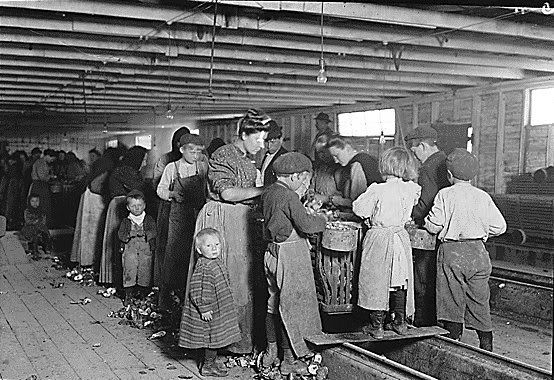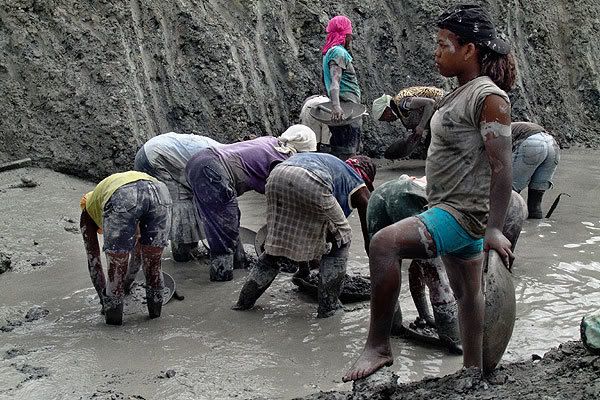
Photo by Lewis W. Hine (1908).
My first assignment for a Transcending Gender class was to find an image that represents Gender in the Future. About halfway though the assignment, I realized it might make a pretty good blog, too.
If I am absolutely and utterly forced to pick only a single image, it ought to be the image above by Lewis Hine of seafood workers in Dunbar, Louisiana during the 1900s. While clearly historical, this image is to me the most accurate (ironic?) depiction of the future of gender.
Despite women accounting for over 47% of the US labor force, issues of childcare are still regularly perceived as a woman’s issue (as opposed to a parenting issue, or simply, an issue). I predict the future of gender will look much as it always has, with women bearing the responsibility for both the productive and reproductive needs of a society.
I find it impossible to pick only one image to depict the future of gender, however. Gender is so loaded; it is fluid in places, sticky in others, it is highly individualized and yet it is also completely culturally prescribed, it is young, old, male, female, everything that is neither and both—
Instead of a single image of Gender in the Future I propose a series of images, depicting respectively the ideal, the immediate, and the probable.

I would like to believe that gender roles in the future will become more mutable, more fluid, with less emphasis on opposing and gendered characteristics and more emphasis on personal characteristics, something that might be represented with the image above from April77's 2007 women's clothing line. The model is almost entirely androgynous- the only indications of gender are the slim profile and painted lips. Free from the constraints of polarized gender characteristics we are allowed to examine our lives as people, and not merely as women or as men.

However, despite my own desire for an androgynously gendered future I think it is more likely that images of consumption will better depict the reality of gender in the future. This photo is from Marc Jacobs, a designer I watch for his astoundingly sexist advertisements (for your edification the legs belong to Victoria Beckham, also known as Posh Spice). This image represents the immediate future of gender- that sexuality, femininity, and masculinity, are defined by what we buy. Not only is gender commodified, but it manages to lower women’s status in the process, reducing the whole female body to certain parts, metaphorically and literally minimizing the focus on the whole woman to her more ‘desirable’ aspects.
Yet even this image of Posh Spice’s legs is lacking, failing to account for the majority of lived experience because it sells images of gender and sexuality to only those who can afford it. The majority of humans will find gender in the future more like these next two images, by photo-essayist Jan Sochor:


The most probable images of the future of gender to me show that women and men both actively play part in economic activities, each toiling in their roles as servant and soldier. The ubiquitous phallic symbol of army rifle clutched to the bosom of a stoic and uniformed solider is in perfect juxtaposition to the equally stoic and supplicant female mine worker. Male will be defined in opposition to female, solider to supplicant. Both male and female must toil, each chained to their own gender role, each too busy with work to have time to question or deconstruct dominate gender roles. These images of the male solider and female mine worker are to me the status quo of gender, and even recognizing the constant and infinite fluidities of culture and identity, the most likely images of gender in the future.
1 comment:
What an interesting post! I think I'm more hopeful about the gender thing, I think we are slowly learning to see shades of grey. But it takes time and effort. I have read somewhere that you spend the first 13 years of your life learning "proper" gender roles and then the rest of your life trying to unlearn everything... I'm not sure if that's a real quote but it's an interesting thought.
Post a Comment